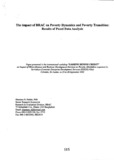The impact of BRAC on poverty dynamics and poverty transition: results of panel data analysis
Citation
Halder, S. R. (2002, September). The impact of BRAC on poverty dynamics and poverty transition: results of panel data analysis. Research Reports (2002): Economic Studies, Vol - XVIII , 165–179.Abstract
This paper looks into the issue of economic graduation of the poor and tries to finding out the impact of
BRAC's Rural Development Programme (RDP) on it. Economic graduation is defined by the upward
mobility of the poor along the poverty-pyramid into non-poor status and the ability of the vulnerable non-poor
to sustain their position. Here both the expenditure and perceptual methods are considered in
defining poverty. For the analysis of impact a panel data set on 419 RDP members and 81 comparable
non-RDP households collected twice in 1997 and 2001 were used. Results show that when poverty
among non-RDP comparison households increased from 68% to 73%, it declined from 59% to 52%
among RDP member households. Poverty gap also declined sharply among the latter group. Regarding
poverty inequality a declining trend was observed for both of the groups. RDP made significant
contribution in the upward mobility of the poor. The extreme poor RDP households did quite well in
terms of upward mobility. Although the rate of overall downward mobility among RDP members was
relatively less than the rate among comparison households, almost half of the RDP's initial non-poor
slipped into poverty. Results of multivariate analysis show significant positive association of poverty
graduation with households' initial wealth base and changes in village level infrastructure which indicate
that for making significant change in the lives of the poor necessary steps should be taken for
strengthening household's physical asset base and also for providing rural infrastructure.

